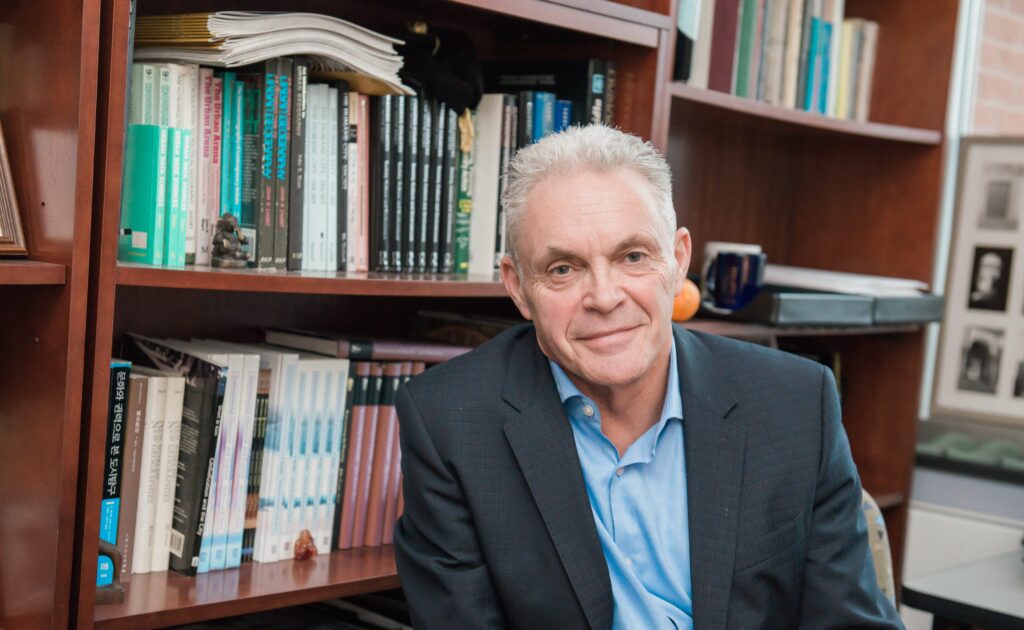John Rennie Short, public policy, is a fan of all the Olympics represent for individual athletes, teams, and countries vying to be recognized as champions on the global stage. However, his new book, Hosting the Olympic Games: The Real Costs for Cities, goes behind the glamour and prestige of the games to focus on how the events come together at a local level.

Rennie Short’s research examines how preparing for a global event on the scale of the Olympics poses significant challenges for host cities, and can have substantial negative impacts for urban communities, from the displacement of marginalized people to environmental harm to shifts in infrastructure investment. The solution? Rennie Short suggests two possibilities: a fixed location or requiring host cities to integrate Olympics proposals into long-term urban development plans.
Rennie Short began to study the Olympics in 2002 when he received a professorship to research globalization and cities at Loughborough University, an institution known for drawing sports scientists because of its large sports library. It was here that his colleagues encouraged him to study the globalization of sport. The Olympics, as the largest global sporting event held in urban areas, was a natural fit with his research.
Two years later Rennie Short received a grant from National Geographic to visit former Olympic host cities struggling to manage the high costs of servicing large, empty sports arenas and hotels, and unemployment in the tourism industry. He took away a trend from these site visits: that many Olympic host cities were using the games for a heightened period of regional development, but that long-term positive impacts often failed to materialize.
“You don’t have to wait long to see the decay unfold. Usually, a journalist will return shortly after the closing of the Olympics and report decaying venues left behind,” says Rennie Short.
Further, to build venues can require destruction as much as construction, he suggests. “In Pyeongchang, parts of ancient forests were cleared and communities were displaced to build ski lifts,” Rennie Short notes. “Who knows what the global impact of disrupting pristine mountain environments will be.”
Rennie Short argues that many of the problems he has found stem from greed and corruption at the local level, with contractors and large landowners often benefiting the most. Once a city wins an Olympic bid, the kinds of investment that follow—building roads to increase access to and from the airport and on clearing land for large sports complexes—tend to benefit Olympics participants and visitors, but not long-term residents. They are also difficult to maintain and take away essential resources from long-term roads, bridges, and buildings with high local use.
Watch John Rennie Short’s interview with NBC Think.
“I feel a social responsibility to taxpayers to inform them of what is happening,” says Rennie Short. “Local communities are not always aware of how their money is being used to take away needed resources for individual gain. But it doesn’t have to be this way.” He draws attention to former host cities like Barcelona, that increased the long-term benefits of hosting by planning years in advance with the local community in mind and exploring ideas for sustainable global tourism plans. He also describes the experiences of cities like London and Sochi, which have emphasized the continued use of existing arenas and event sites.
While arguing for a fixed Olympics location that would decrease the need for intensive planning and investment in different host cities, Rennie Short says these cities offer examples for how to adjust the existing model to make it work for host city residents. “If the games don’t switch to a more sustainable centralized fixed location,” he argues,”then host cities must lead the way in innovative, sustainable, eco-friendly development.”
To read more about the Rennie Short’s thoughts on the urban impact of the Olympics read: “The Olympics should be in Vancouver. Winter and Summer. Every two years.” in Slate; “On rocky road to Rio, the biggest loser may be the glory of hosting Olympics,” in The Conversation” and “We should host the Olympics in the same place every time,” in The Washington Post.”
Banner Image: Untitled photo of Beijing Olympic site, November 2012, by Marko Kudjerski (CC BY 2.0)
Tags: CAHSS, International Stories, PublicPolicy, sustainability

